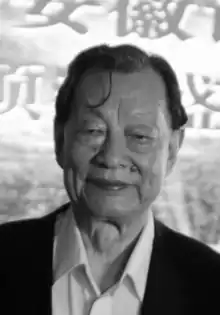Yan Zhen
Yan Zhen (born 1930) is a Chinese poet, painter, and calligrapher, best known in China for his writing. Yan has published over 30 works of literature, including poetry, prose, and fiction. He was the editor of Jiaodong Daily (胶东日报), the Deputy Head of the Anhui Journal of Art and Literature (安徽省文艺创作研究室), vice editor in chief of Qing Ming Journal (清明), editor in chief of Poetry Journal (诗歌报), and a council member of the China Writers Association, or CWA (中国作协). Yan lives and works in Beijing.

Life and work
Yan was born in 1930 in Laiyang, Shandong Province, and spent most of his childhood in a small village with his family. His father was a primary school teacher.[1] He left home at thirteen to join the revolutionary forces resisting the occupying Japanese.[2]
During the Cultural Revolution (1966–76), Yan was denounced by Red Guards. Both he and his wife were sent to separate parts of the countryside as a result. In 1985, Yan was among the first delegation of Chinese writers to go abroad after the end of the Cultural Revolution, and visited a number of American cities.[2]
Writing
Yan published his first volume of poetry at 24, and in the early stage of his career comprised one of the five “Great Young Poets”, lauded as documenters of the social and cultural zeitgeist. He has been described as "one of the most promising poets in the early years of the founding of the People's Republic of China".[3] In 1963-64, he was considered among the most successful young poets in the nation.[4]
Notable works include Girl Beside the Huai River (淮河姑娘, 1955),[4] Jiangnan Song (江南曲), Guqin Spring (琴泉), the essay collection Peony Courtyard (牡丹园记), the novel Barren Tracks (荒漠奇踪), and the novella Rose of the Southern Country (南国的玫瑰).
Painting
Yan uses both watercolor and oil.
His work has been exhibited in China and internationally, including at the National Art Museum of China. His watercolor Beginning to Snow at Lotus Pond was sold in a 2007 Sotheby's auction in New York.[5] He had his first show in the city in 2008, at the Fuller Building's Neuhoff Gallery.[6]
References
- Liu, Xiangrui (17 June 2014). "Artist finds power in poems and paintings". Retrieved 29 May 2016.
- Uren, David (February 9, 2013). "Yan Zhen is the Chinese People's Poet". The Australian. Retrieved 29 May 2016.
- "Poetic Devices - Chinese artist Yan Zhen uses words, ink and water to create "something from nothing"". Beijing Review. 18 September 2014. ProQuest 1562284050.
- Hong, Zicheng (2007). A History of Contemporary Chinese Literature. Leiden, Netherlands: Brill. pp. 82, 85, 87.
- "Yan Zhen, Beginning to Snow in Lotus Pond". Sotheby's. Sotheby's. 30 September 2007. Retrieved 29 May 2016.
- "Yan Zhen "Passage to My World"". NY Art Beat. Art Beat Network. 2 October 2008. Retrieved 29 May 2016.
External links
- Yan Zhen's website.